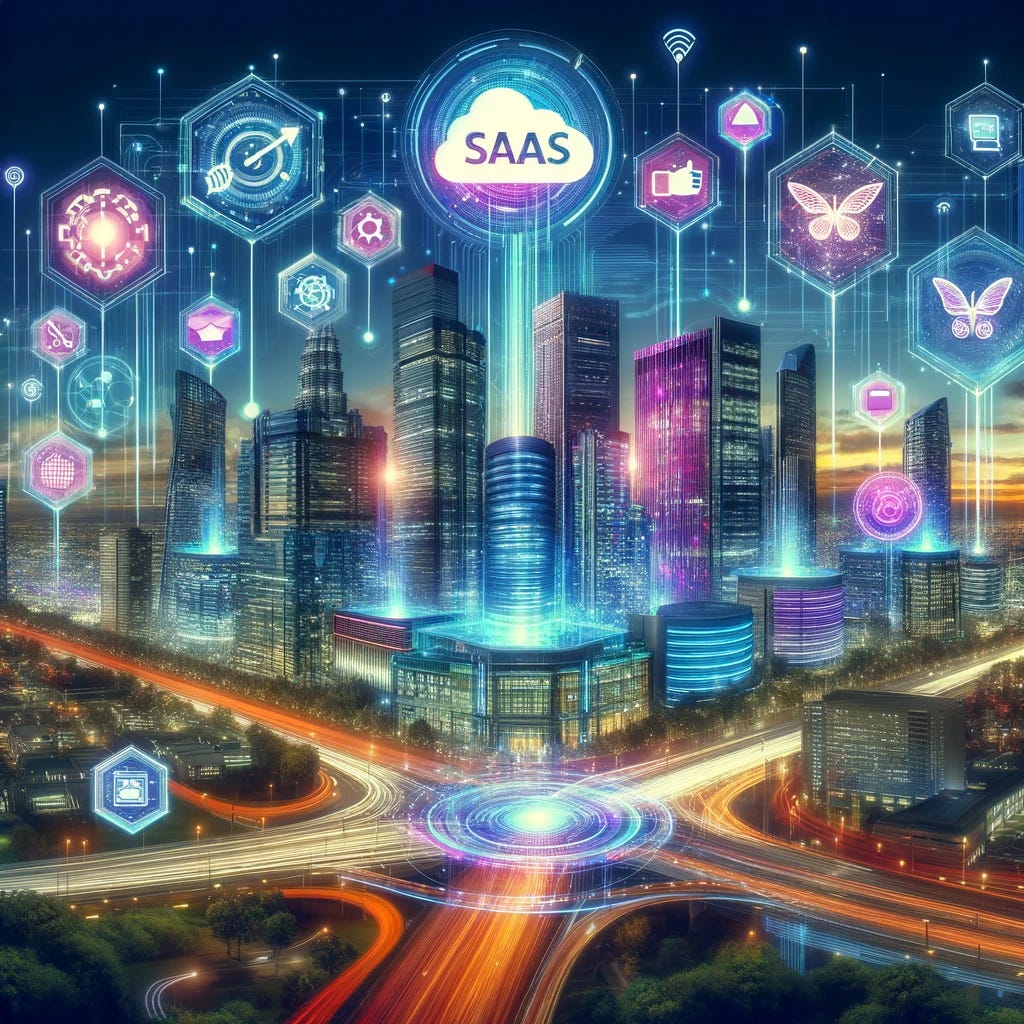The AI-Driven SaaS Landscape in 2024: Key Trends and Innovations
This is Part Three of a Four-Part Series focusing on AI's Impact in the Enterprise & Software Industry
This post examines how AI will reshape the SaaS industry in 2024, exploring its impacts on growth and the implications for enterprises and vendors. SaaS grew over 300% from 2012-2018 (Source: Harvard Business Review), significantly outpacing broader markets. While initially accelerated by low rates and abundant funding, recent changes have disrupted growth. Future expansion depends on cloud adoption, demand for cost-effective scaling, and AI implementation, although activation, retention, competition, slow revenue, profitability, and efficiency challenges remain. Overall, AI promises to transform SaaS by enabling personalized, intelligent, and efficient solutions, but realizing this potential requires overcoming data, integration, talent, and trust obstacles.
Given the evolving trends in the SaaS market, AI is poised to have a profound impact on the SaaS industry in several ways:
Enhanced Personalization and User Experience: AI technologies, especially those involving ML and NLP, will allow SaaS platforms to offer highly personalized experiences. By analyzing user behavior, preferences, and interactions, these platforms can tailor their functionality as an application to individual needs, enhancing user satisfaction and engagement.
Adoption Across Various Business Functions: SaaS tools, increasingly integrated with AI and ML, are broadly adopted across various business functions and likely to to expand. These integrations add capabilities like predictive analytics, personalized recommendations, automation of routine tasks, and customer metrics, thereby enhancing user experience and data insights.
Expanded Vertical Solutions: The adoption of AI across various industry verticals, including healthcare, insurance, finance and manufacturing is on the rise, especially among small and medium-sized enterprises (SMEs). This trend is centered around minimizing human input in both back-office and customer interaction roles. AI will enhance efficiency, accuracy, and consistency, while also diminishing the reliance on manual labor and associated costs. These advancements pave the way for solutions that address compliance with regulations, especially to ensure adherence to regulatory standards such as HIPAA in healthcare and SOX in finance as just two examples. One notable example of startups that is tapping into this trend is Praxos, a company that allow insurance brokers to create their own workflow automation without requiring software programming skills.
Improved Data Analytics and Insights: SaaS apps with AI built-in will be able to process and analyze large volumes of data to provide valuable insights. This can help businesses in decision-making, predicting market trends, drive large financial and scientific models, and understanding customer behavior, among other capabilities.
Optimized Resource Management: AI and ML will enable more efficient use of resources in SaaS infrastructure. Predictive analytics can help in anticipating demand, thereby enabling dynamic allocation of computing resources. This leads to both cost savings and high availability and performance.
Advanced Security: With the importance of safeguarding sensitive data in SaaS applications and supporting infrastructure, AI is now crucial for detecting potential breaches, offering proactive security, and quickly responding to threats, thus strengthening SaaS platform security. SaaS vendors are enhancing security through improved access controls, network security, and implementing measures like multi-factor authentication to deter unauthorized access.
Transforming the Blockchain and Edge Computing: The integration of blockchain with AI offers efficient transaction processing, including smart contracts (see Dowsers as a leading vendor) and decentralized data management. This is particularly valuable in sectors like finance and healthcare, where data integrity and security are critical. Furthermore, edge computing brings processing power closer to the data source. With AI, this shift not only improves efficiency and reduces latency but also bolsters security and enhancing real-time applications by bringing about quicker response times, better performance, and an improved user experience.
Automated Customer Support and Service: AI-driven automation is revolutionizing customer support in SaaS. Chatbots and virtual assistants, powered by AI, can handle routine inquiries and support tasks, offering real-time, efficient responses. This not only enhances customer service but also allows human resources to focus on more complex issues.
As we enter 2024, it is clear that AI will fundamentally boost sales prospects and help maintain the SaaS industry momentum, offering enhanced personalization, security, and efficiency across various sectors. There are significant opportunities for innovation and growth, but also this market moment presents challenges in integration and security. The future of SaaS lies in embracing AI as a key driver of advancement and competitive edge in the digital era.
Gentle Reader: Don’t miss the follow-on to this post on the subject of startup, later-stage and public SaaS co. valuations that will be published tomorrow.


